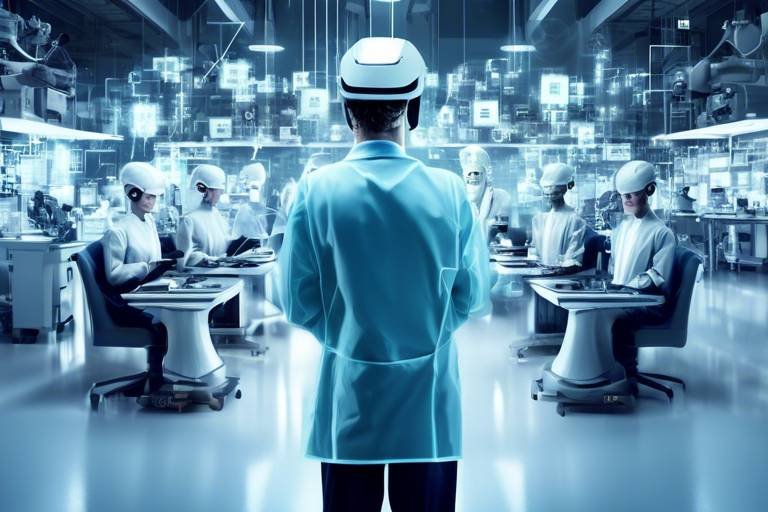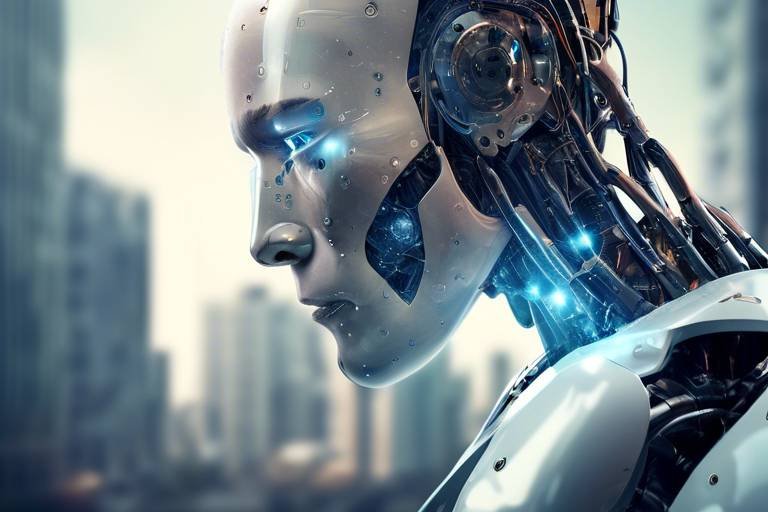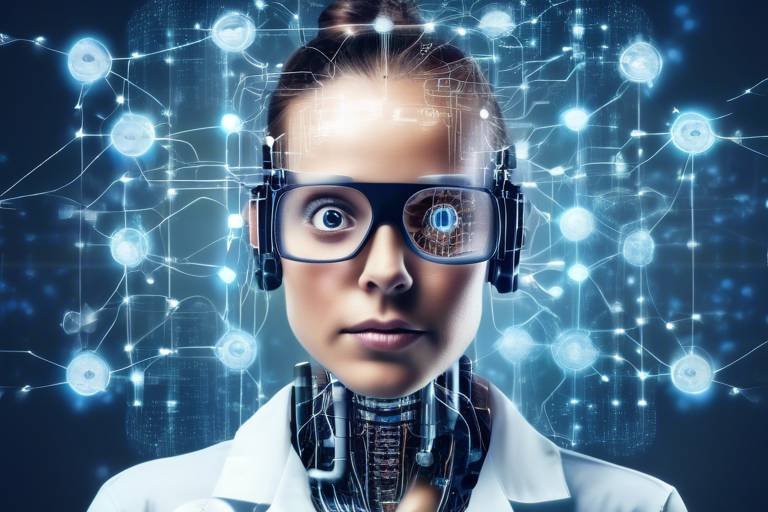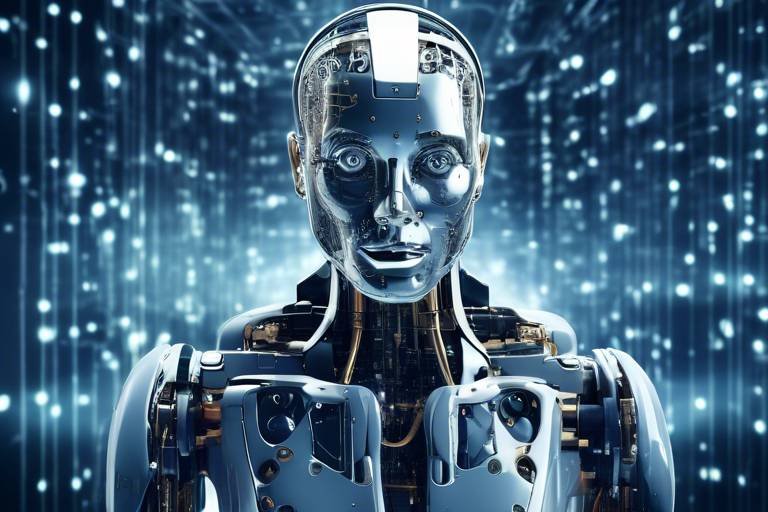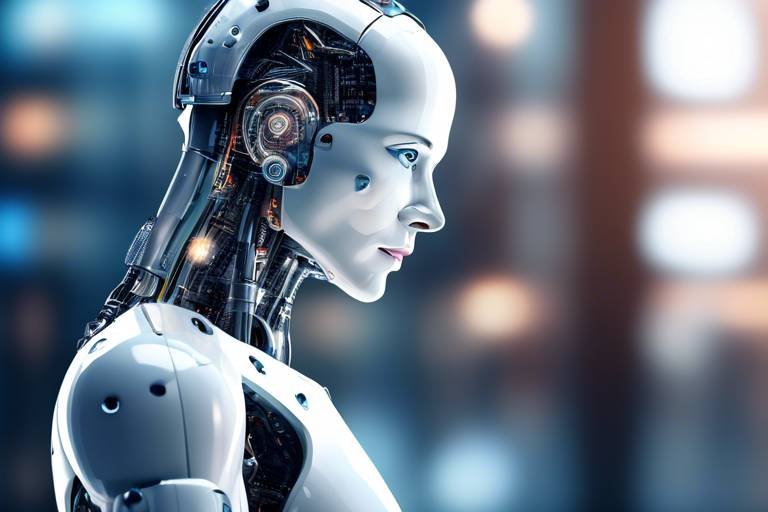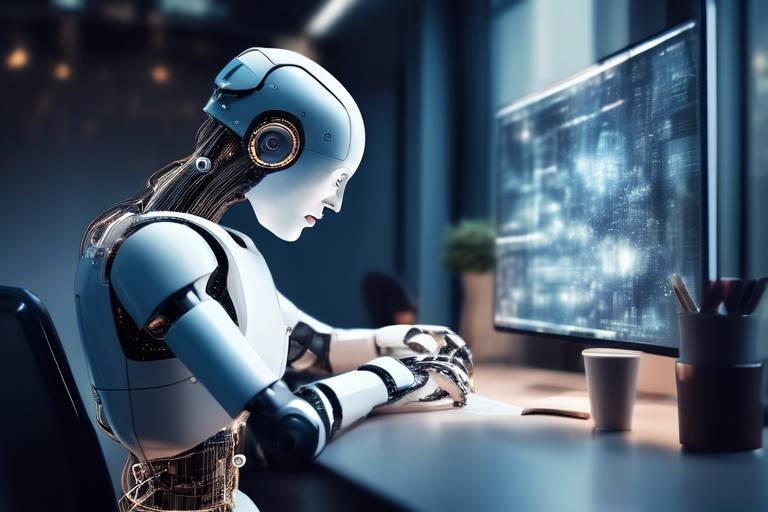AI's Role in Shaping the Quality of Future Jobs
Artificial Intelligence (AI) is no longer just a futuristic concept confined to the realms of science fiction; it is actively reshaping the landscape of employment across various sectors. As we stand on the brink of a new era, it’s crucial to understand how AI is not only altering job functions but also redefining what it means to work. With its ability to analyze vast amounts of data and automate repetitive tasks, AI enhances productivity and efficiency, allowing humans to focus on more complex and creative aspects of their jobs. Imagine a world where mundane tasks are handled by intelligent systems, freeing up time for innovation and strategic thinking. This transformation is both exciting and daunting, as it brings forth a wave of new opportunities while posing significant challenges.
One of the most significant impacts of AI is its dual role in job creation and displacement. While many fear that machines will take over jobs, the reality is more nuanced. AI technologies are paving the way for entirely new job categories that didn’t exist a decade ago. For instance, roles such as AI ethicists, data scientists, and machine learning engineers are becoming increasingly vital in today’s workforce. These positions require a unique blend of technical knowledge and creative problem-solving skills, showcasing how AI is not just a threat but also a catalyst for innovation in the job market.
Furthermore, as AI continues to evolve, the skills required for future employment are also changing. The demand for specific competencies is shifting towards a more integrated approach that combines both technical skills and soft skills. For instance, while programming and data analysis are essential, the ability to communicate effectively and work collaboratively in teams is becoming equally important. This balance is crucial in a technology-enhanced workplace where human interaction and creativity are irreplaceable by machines.
In light of these changes, the concept of lifelong learning takes center stage. The rapid pace of technological advancements means that workers must commit to continuous education and training to remain relevant. Organizations and individuals alike must embrace a mindset of adaptability, actively seeking out opportunities to learn and grow. Whether through online courses, workshops, or professional development programs, the need for ongoing education is paramount in keeping pace with AI advancements.
Moreover, the integration of AI into the workforce raises ethical considerations that cannot be overlooked. Issues such as bias in AI algorithms and the responsibility of companies to ensure fair practices are becoming increasingly pressing. As we navigate this new employment landscape, it is imperative to establish regulatory frameworks that guide the ethical use of AI in hiring and job management. This ensures not only fairness and equity in employment opportunities but also fosters a work environment where technology and humanity can coexist harmoniously.
To summarize, AI's role in shaping the quality of future jobs is multifaceted. It brings forth exciting opportunities for job creation, demands a new set of skills, emphasizes the importance of lifelong learning, and raises critical ethical questions. As we embrace this technological revolution, it is essential to remain vigilant and proactive in addressing the challenges it presents, ensuring that the future of work is not only efficient but also equitable and fulfilling for all.
- How is AI creating new jobs? AI is leading to the emergence of new roles that require specialized skills, such as data analysts and AI trainers.
- What skills will be important in the future job market? A combination of technical skills, like programming, and soft skills, such as communication and teamwork, will be essential.
- How can workers adapt to AI advancements? Continuous learning and being open to new technologies are crucial for adapting to the changing job landscape.
- What are the ethical concerns related to AI in employment? Concerns include bias in algorithms and the need for fair hiring practices.
- Why is lifelong learning important in the age of AI? Lifelong learning helps individuals keep their skills relevant and competitive in a rapidly evolving job market.

The Impact of AI on Job Creation
Artificial Intelligence (AI) is often perceived as a double-edged sword in the job market. On one hand, it raises concerns about job displacement; on the other, it opens up a plethora of new opportunities. Think about it: just as the industrial revolution transformed manual labor into factory jobs, AI is reshaping the landscape of employment today. It's not merely about machines taking over tasks; it's about innovation leading to the creation of entirely new job categories and industries.
For instance, as AI technologies advance, roles that we can't even imagine today are emerging. Have you ever heard of a Data Ethicist? This is a new position that focuses on the ethical implications of AI data usage. Similarly, jobs like AI Trainers and Algorithm Bias Auditors are becoming increasingly critical. These roles require a unique blend of skills that combine technical knowledge with ethical considerations, emphasizing the importance of a well-rounded education.
Moreover, AI is enhancing productivity across various sectors, leading to the creation of new markets and the expansion of existing ones. For example, the rise of autonomous vehicles is not only spawning jobs in tech development but also in logistics, maintenance, and regulatory compliance. The ripple effect of AI's integration into the workforce is profound, influencing everything from agriculture to healthcare. Below is a table that highlights some emerging jobs that AI is creating:
| Emerging Job Title | Description |
|---|---|
| AI Trainer | Professionals who train AI systems to recognize patterns and make decisions. |
| Data Ethicist | Experts who ensure that AI data usage aligns with ethical standards. |
| Algorithm Bias Auditor | Individuals who analyze AI algorithms to identify and mitigate biases. |
| Robotics Coordinator | Professionals who manage the integration of robotic systems into existing workflows. |
It's essential to recognize that while AI can automate routine tasks, it also creates opportunities for higher-level thinking and creativity. As mundane tasks are handled by machines, workers can focus on more strategic, innovative roles that require human intuition and empathy. This shift is akin to how calculators allowed mathematicians to concentrate on solving complex problems rather than performing basic arithmetic. The key takeaway here is that AI is not just a job killer; it’s a job creator, paving the way for a more dynamic and engaging workforce.
In conclusion, the impact of AI on job creation is significant and multifaceted. It’s crucial for both individuals and organizations to adapt to these changes, embracing the opportunities that AI presents while preparing for the challenges it may bring. The future of work will undoubtedly be different, but with a proactive approach, we can harness the potential of AI to create a workforce that is not only more efficient but also more fulfilling.

Skills Required for Future Employment
As we navigate the rapidly evolving landscape of work, it’s crucial to understand the . The advent of artificial intelligence (AI) is reshaping not only the types of jobs available but also the competencies needed to excel in them. In this new era, traditional skills are being supplemented—and sometimes replaced—by a new set of abilities that align with technological advancements. Think of it like upgrading your smartphone; just as new features emerge, so too must our skill sets adapt to harness the full potential of AI.
To thrive in this AI-driven job market, workers will need a blend of technical skills and soft skills. Technical skills often refer to specific knowledge and abilities related to technology, such as programming languages, data analysis, and machine learning. For example, understanding how to operate AI tools or analyze data trends can significantly enhance a worker's value in the job market. However, it's not just about the hard skills; soft skills are equally vital. These include communication, collaboration, and emotional intelligence. In a world where AI handles many technical tasks, the human touch becomes paramount.
One of the most important aspects of this skill evolution is the need for lifelong learning. The job market is not static; it’s dynamic and constantly changing. Workers must embrace a mindset of continuous education, whether through formal training programs, online courses, or self-directed learning. This commitment to lifelong learning ensures that individuals remain competitive and relevant in their fields. For instance, a marketing professional might need to learn about AI-driven analytics to better understand consumer behavior, while a healthcare worker may need to get familiar with telemedicine technologies.
Moreover, adapting to new technologies is not just a personal responsibility; it's a collective effort. Organizations should foster a culture of innovation and adaptability, encouraging their employees to experiment with new tools and methods. This could involve workshops, hackathons, or collaborative projects that integrate AI into everyday tasks. By doing so, companies can ensure that their workforce is not only equipped with the necessary skills but also motivated to embrace change.
In summary, the skills required for future employment are multifaceted. They encompass a mix of technical expertise and soft skills, all underpinned by a commitment to lifelong learning and adaptability. As we continue to witness the integration of AI into various sectors, the ability to evolve and grow will be the key to success in the job market of the future. So, are you ready to upgrade your skills?

Technical Skills vs. Soft Skills
In the ever-evolving landscape of the job market, the debate between technical skills and soft skills has gained significant traction. As artificial intelligence (AI) continues to reshape industries, it's becoming increasingly clear that both skill sets hold immense value, but they serve different purposes in the workplace. Think of technical skills as the engine of a car—necessary for functionality—while soft skills are akin to the steering wheel, guiding the direction and ensuring a smooth ride. Without one, the other may struggle to perform effectively.
Technical skills encompass a range of specific knowledge and abilities, often related to technology and data analysis. For instance, proficiency in programming languages, data analytics, and machine learning are crucial for roles in tech-driven sectors. These skills enable employees to leverage AI tools, automate processes, and analyze vast amounts of data to drive decision-making. In a world where digital transformation is a constant, possessing strong technical skills can set candidates apart in a competitive job market.
On the flip side, soft skills—such as communication, teamwork, adaptability, and emotional intelligence—are becoming increasingly vital in an AI-enhanced workplace. As machines take over repetitive tasks, the human elements of creativity and interpersonal relations are what will differentiate employees. For example, the ability to effectively communicate complex ideas to a team or collaborate across departments can lead to more innovative solutions and a more cohesive work environment. In fact, many employers are starting to prioritize these soft skills during the hiring process, recognizing that a technically skilled employee who lacks strong interpersonal abilities may struggle to thrive.
Interestingly, the synergy between technical and soft skills is where the magic happens. According to a recent study, companies that prioritize both skill sets see a 30% increase in productivity and employee satisfaction. This highlights the importance of a balanced skill set in navigating the complexities of modern work. For instance, a data analyst who can interpret data trends but also communicate findings clearly to stakeholders will be far more valuable than one who can only crunch numbers without context.
As we move forward, it's essential for job seekers and current employees alike to embrace both technical and soft skills. Continuous learning and development in both areas will not only enhance individual career prospects but also contribute to a more adaptable workforce. Companies, too, must foster environments that cultivate these skills through training programs, mentorship, and collaborative projects. After all, in a world where AI is becoming ubiquitous, the human touch remains irreplaceable.
- What are technical skills? Technical skills refer to specific knowledge and abilities related to technology and data, such as programming, data analysis, and machine learning.
- What are soft skills? Soft skills are interpersonal skills that include communication, teamwork, adaptability, and emotional intelligence.
- Why are both skill sets important? Both technical and soft skills are essential for navigating modern workplaces, as they complement each other and enhance overall productivity and collaboration.
- How can I improve my technical skills? You can improve your technical skills through online courses, workshops, and hands-on projects that allow you to practice and apply your knowledge.
- How can I develop my soft skills? Soft skills can be developed through practice, feedback, and engaging in activities that require teamwork and communication, such as group projects or public speaking.

The Importance of Lifelong Learning
In today's fast-paced world, the concept of lifelong learning has never been more crucial. As artificial intelligence (AI) continues to evolve, the skills that were once deemed essential can quickly become obsolete. Imagine a world where your knowledge is like a smartphone—if you don’t update it regularly, it becomes less functional over time. This analogy highlights the necessity for individuals to engage in continuous education and skill enhancement.
Lifelong learning isn't just about attending formal classes or obtaining degrees; it encompasses a wide range of activities that enhance one's knowledge and skills throughout life. From online courses to workshops and self-directed learning, the opportunities are endless. The beauty of lifelong learning lies in its flexibility. You can tailor your learning path to fit your personal interests and career aspirations. For instance, a marketing professional might delve into data analytics to better understand consumer behavior, while a teacher might explore new educational technologies to enhance the learning experience for students.
Furthermore, the job market is increasingly valuing individuals who demonstrate a commitment to ongoing education. Employers are on the lookout for candidates who can adapt to new challenges and technologies. According to a recent study, companies that prioritize employee development see a 25% increase in productivity. This statistic underscores the competitive edge that lifelong learners possess. They are not just keeping up with the changes; they are driving innovation and progress within their organizations.
However, the journey of lifelong learning does come with its challenges. Many individuals struggle to find the time or resources to invest in their education amidst the demands of daily life. To combat this, it's essential to adopt a mindset that values learning as a daily practice rather than a sporadic endeavor. Here are some strategies to incorporate lifelong learning into your routine:
- Set Learning Goals: Define what skills or knowledge you want to acquire and create a plan to achieve them.
- Utilize Online Platforms: Websites like Coursera, Udemy, and LinkedIn Learning offer a plethora of courses that can be accessed at your convenience.
- Join Learning Communities: Engage with peers who share similar interests. This can provide motivation and accountability.
- Stay Curious: Cultivate a habit of asking questions and seeking out new experiences that expand your horizons.
In conclusion, embracing the philosophy of lifelong learning is not just a personal choice; it’s a necessity in an AI-driven world. By continuously updating our skills and knowledge, we not only enhance our employability but also enrich our lives. Remember, the only constant in life is change, and by committing to lifelong learning, you can navigate that change with confidence and creativity.
Q1: What is lifelong learning?
A1: Lifelong learning is the ongoing, voluntary, and self-motivated pursuit of knowledge for personal or professional development. It can include formal education, online courses, workshops, and self-study.
Q2: Why is lifelong learning important in the age of AI?
A2: As AI technology evolves, the skills required in the job market are changing rapidly. Lifelong learning helps individuals stay relevant, adapt to new technologies, and enhance their career prospects.
Q3: How can I incorporate lifelong learning into my busy schedule?
A3: You can set specific learning goals, utilize online platforms for flexible learning, join study groups, and remain curious about new subjects to seamlessly integrate learning into your daily routine.

Adapting to New Technologies
In today's fast-paced world, is not just a skill; it’s a necessity. As artificial intelligence continues to reshape industries, workers find themselves at a crossroads. The question is: how can we effectively integrate these advanced tools into our daily workflows? Imagine trying to navigate a new city without a map; that’s how many feel when faced with new tech. However, with the right approach, this transition can be smooth and even exciting.
The first step in adapting to new technologies is to cultivate a mindset of curiosity and openness. Instead of fearing change, embrace it! This means being willing to learn and explore how AI can enhance your productivity. For instance, consider how AI-powered tools can automate mundane tasks, allowing you to focus on more creative and strategic aspects of your job. It’s like having a personal assistant that never sleeps!
Next, training and education play a crucial role in this adaptation process. Organizations should invest in workshops and training sessions that focus on the latest technologies. This could include hands-on training with AI tools, coding boot camps, or even online courses. When employees feel equipped with the right knowledge, they are more likely to embrace these changes rather than resist them. Just think about how learning to use a smartphone transformed communication; the same can happen with AI in the workplace!
Moreover, collaboration is key. Working alongside tech-savvy colleagues can provide invaluable insights. Forming cross-functional teams that include both tech experts and industry veterans can encourage knowledge sharing and foster a culture of innovation. When everyone contributes their unique perspective, the result is a more harmonious integration of technology.
Lastly, it's essential to monitor progress and remain flexible. The landscape of technology is ever-changing, and what works today might not be relevant tomorrow. Regularly assessing how well new tools are being integrated and being open to adjustments is vital. This iterative approach ensures that workers are not just keeping up but are ahead of the curve.
In conclusion, adapting to new technologies requires a blend of curiosity, training, collaboration, and flexibility. By embracing these elements, workers can not only survive but thrive in an AI-driven landscape. After all, the future isn’t something we enter; it’s something we create together!
- What is the best way to start learning about AI technologies?
Begin with online courses or workshops that focus on basic concepts and gradually move to more advanced topics. - How can I convince my employer to invest in AI training?
Present data on how AI can improve productivity and efficiency, highlighting potential ROI from training programs. - Are there specific industries more affected by AI?
Yes, sectors like manufacturing, retail, and customer service are experiencing significant changes due to automation. - What soft skills are important when working with AI?
Skills like communication, problem-solving, and adaptability are crucial as they complement technical abilities.

AI and Job Displacement
As we stand on the brink of a technological revolution, the conversation around is more pressing than ever. It’s no secret that artificial intelligence is reshaping the workforce landscape, but what does this mean for the millions of workers whose roles may be at risk? While AI is a powerful tool that can enhance efficiency and productivity, it also poses significant challenges, particularly in industries where automation can replace human labor.
To put it simply, the rise of AI is akin to a double-edged sword. On one hand, we have the potential for increased productivity, reduced costs, and even the creation of new job categories. On the other hand, we face the stark reality that certain jobs—especially those that involve repetitive tasks—are becoming obsolete. For instance, roles in manufacturing, data entry, and even customer service are increasingly being handled by AI systems capable of performing these tasks faster and more accurately than humans.
Let’s take a closer look at some of the sectors most affected by this wave of automation:
- Manufacturing: Robots and AI-driven machines are now capable of assembling products with precision, reducing the need for human workers on the factory floor.
- Transportation: With the advent of self-driving vehicles, the future of jobs in trucking and delivery services is uncertain.
- Retail: Automated checkout systems and AI-driven inventory management are changing the way consumers shop, impacting cashiers and stock clerks.
But it’s not all doom and gloom. While AI may displace certain jobs, it also opens the door for new opportunities that require a different set of skills. For example, as we automate routine tasks, there’s a growing demand for professionals who can design, maintain, and improve AI systems. This shift necessitates a workforce that is not only tech-savvy but also adaptable and willing to learn new skills.
Moreover, the impact of AI on job displacement varies significantly across different demographics and regions. For instance, younger workers who are more familiar with technology may find it easier to transition into new roles, while older workers may face greater challenges. To address this disparity, it’s essential for companies and governments to implement training programs aimed at reskilling those displaced by AI. By investing in education and continuous learning, we can create a more resilient workforce capable of thriving in an AI-driven economy.
In conclusion, while AI undoubtedly presents challenges in terms of job displacement, it also offers opportunities for innovation and growth. The key lies in how we respond to these changes. By embracing lifelong learning and adapting to new technologies, workers can navigate this evolving landscape and find their place in the future job market.
- Will AI really take away all our jobs? - While AI will automate certain tasks, it will also create new jobs that require different skills.
- What should I do if my job is at risk of being automated? - Focus on developing skills that are in demand, particularly in technology and human-centric roles.
- How can companies support workers who are displaced by AI? - Companies can invest in reskilling programs and provide resources for continuous learning.

Ethical Considerations in AI Employment
The integration of artificial intelligence into the workforce is a double-edged sword, presenting both remarkable opportunities and significant ethical dilemmas. As we dive deeper into this technological revolution, we must pause and reflect on the implications that AI has on employment. After all, with great power comes great responsibility, right? The potential for bias in AI algorithms is a pressing concern that cannot be overlooked. For instance, if an AI system is trained on historical hiring data that reflects societal biases, it may inadvertently perpetuate those biases in its decision-making processes. This raises a critical question: how can we ensure that AI is used responsibly in hiring practices?
Moreover, the responsibility lies not only with the developers of AI systems but also with companies that implement these technologies. They must take proactive steps to mitigate bias and ensure fairness in their hiring processes. This includes regularly auditing AI systems for discriminatory patterns and ensuring diversity in the teams that design these algorithms. Imagine a world where job opportunities are determined not by qualifications but by the biases embedded in code—it's a scenario we must strive to avoid.
To address these ethical considerations effectively, companies should adopt a framework that emphasizes transparency, accountability, and inclusivity. This can involve creating guidelines for ethical AI use, providing training for employees on recognizing bias, and establishing clear channels for reporting discrimination. The goal is to foster an environment where AI enhances fairness rather than undermines it.
Furthermore, as AI continues to evolve, regulatory frameworks will play a crucial role in guiding its ethical use in employment settings. Governments and regulatory bodies must step in to create policies that protect workers' rights and ensure that AI technologies are employed in a manner that promotes equity. This could involve legislation that mandates transparency in AI decision-making processes or requires companies to disclose how AI is used in hiring decisions.
In summary, ethical considerations in AI employment are complex and multifaceted. They require a collaborative effort from developers, employers, and regulators to ensure that the benefits of AI are realized without compromising fairness and equity. As we embrace the future of work shaped by AI, let’s not forget our moral compass. After all, technology should serve humanity, not the other way around.
- What are the main ethical concerns regarding AI in employment? The primary concerns include bias in AI algorithms, transparency in decision-making, and the potential for job displacement.
- How can companies ensure fairness in AI hiring practices? Companies can ensure fairness by regularly auditing their AI systems, training employees on bias recognition, and promoting diversity in algorithm design teams.
- What role do regulatory frameworks play in AI employment? Regulatory frameworks help guide the ethical use of AI in employment, ensuring that technologies are used responsibly and that workers' rights are protected.

Ensuring Fairness and Equity
As we delve deeper into the integration of AI in the workplace, the question of fairness and equity becomes paramount. With the potential for algorithms to perpetuate existing biases, it’s crucial to ensure that AI systems are designed with equitable outcomes in mind. Imagine a world where hiring decisions are made solely based on data, but that data reflects historical inequalities—this could lead to a cycle of disadvantage for marginalized groups. Therefore, the responsibility lies with organizations to actively mitigate these risks and promote a fairer job market.
One effective strategy is the implementation of diverse data sets in training AI systems. By ensuring that the data used is representative of various demographics, companies can reduce the likelihood of bias. Furthermore, regular audits of AI systems should be conducted to identify and rectify any unintended discriminatory outcomes. This proactive approach not only fosters a sense of trust among employees but also enhances the overall workplace culture.
Moreover, organizations should prioritize transparency in their AI processes. Employees and job seekers alike should be informed about how AI tools influence hiring and promotion decisions. This transparency builds trust and allows individuals to understand and challenge decisions that may seem unfair. For instance, if an applicant is rejected by an AI system, providing feedback on the decision-making process can empower them to improve in the future.
In addition to these measures, companies must also focus on training and education. Providing employees with resources to understand AI and its implications can foster an inclusive environment. By equipping workers with knowledge about how AI systems operate, organizations can encourage dialogue about fairness and equity, ensuring that all voices are heard in the conversation.
Ultimately, ensuring fairness in AI employment practices is not just about compliance; it is about creating a workplace where everyone has a fair shot at success. When companies commit to these principles, they not only enhance their reputation but also drive innovation by harnessing the full potential of a diverse workforce.
- What are the main ethical concerns regarding AI in employment? The primary concerns include bias in algorithms, transparency in decision-making, and the potential for job displacement.
- How can companies ensure their AI systems are fair? By using diverse data sets, conducting regular audits, and fostering transparency in AI processes.
- Why is lifelong learning important in an AI-driven job market? Continuous learning helps workers adapt to new technologies and stay relevant in their fields.
- What role do soft skills play in an AI-enhanced workplace? Soft skills, such as communication and teamwork, are essential for collaboration and navigating the complexities of a technology-driven environment.

Regulatory Frameworks for AI in Employment
The rapid evolution of artificial intelligence (AI) has brought forth a myriad of opportunities and challenges in the job market. As we embrace this technological revolution, it becomes increasingly crucial to establish regulatory frameworks that govern the use of AI in employment settings. These frameworks are essential for ensuring that the integration of AI is conducted in a manner that is ethical, transparent, and beneficial for all stakeholders involved.
One of the primary objectives of regulatory frameworks is to protect workers' rights while promoting innovation. Regulations can guide how companies implement AI technologies, ensuring that they do not inadvertently perpetuate bias or discrimination. For instance, AI systems used in hiring processes must be scrutinized to prevent algorithmic bias, which can lead to unfair treatment of candidates based on race, gender, or other protected characteristics. By establishing clear guidelines, we can create a level playing field where all job seekers have equal access to opportunities.
Moreover, regulatory frameworks can aid in addressing the issue of job displacement caused by automation. As certain roles become obsolete, it is vital for governments and organizations to collaborate on strategies that facilitate workforce transition. This can include offering retraining programs, upskilling initiatives, and support for those affected by job loss. For example, a comprehensive regulatory approach might involve:
- Mandating companies to provide training for workers transitioning to new roles.
- Establishing partnerships with educational institutions to develop relevant curricula.
- Creating safety nets for displaced workers, such as unemployment benefits and job placement services.
In addition to protecting workers, regulatory frameworks also serve to foster public trust in AI technologies. When people are assured that there are robust measures in place to oversee AI implementations, they are more likely to embrace these innovations. Transparency in how AI systems operate and make decisions can alleviate fears and misconceptions about the technology. This leads to a more informed public that can engage with AI in a constructive manner.
Furthermore, as AI continues to evolve, it is essential for regulatory frameworks to be adaptable and forward-thinking. This means that lawmakers and industry leaders must work together to regularly review and update regulations to keep pace with technological advancements. A static approach could lead to outdated regulations that stifle innovation or fail to address emerging ethical concerns. Therefore, creating a dynamic regulatory environment is vital for the ongoing development of AI in the workplace.
Lastly, international cooperation is crucial in establishing effective regulatory frameworks. AI is a global phenomenon, and its impacts transcend borders. Countries must collaborate to develop standardized regulations that promote ethical AI use while considering cultural differences and regional needs. This can help prevent regulatory arbitrage, where companies relocate to jurisdictions with lax regulations, potentially undermining workers' rights and ethical standards.
In conclusion, the establishment of regulatory frameworks for AI in employment is not just a necessity; it is a responsibility. By prioritizing fairness, transparency, and adaptability, we can harness the full potential of AI while safeguarding the interests of workers and society as a whole. As we move forward, let us ensure that these frameworks are not merely reactive but proactive, paving the way for a future where AI and human labor coexist harmoniously.
- What are the main goals of regulatory frameworks for AI?
Regulatory frameworks aim to protect workers' rights, ensure fairness in AI implementations, and foster public trust in AI technologies. - How can regulations help with job displacement?
Regulations can mandate retraining programs, support upskilling initiatives, and establish safety nets for displaced workers. - Why is international cooperation important in AI regulation?
International cooperation helps create standardized regulations that prevent regulatory arbitrage and ensure ethical AI use across borders.
Frequently Asked Questions
- How is AI impacting job creation?
AI is playing a dual role in the job market. While it's true that certain jobs are being automated, AI is also creating new opportunities and industries. Think of it like a tree growing new branches; as technology evolves, new roles emerge that we might not even be able to imagine yet!
- What skills will be essential for future employment?
As we move towards an AI-driven job market, both technical skills—like programming and data analysis—and soft skills—such as communication and emotional intelligence—are becoming increasingly important. It's all about finding the right balance; after all, a great chef needs both the right ingredients and the skill to cook!
- Why is lifelong learning important in the age of AI?
In a world where technology is changing at lightning speed, lifelong learning is crucial. It’s like being on a never-ending treadmill; if you stop running, you'll fall behind. Continuous education and training help workers stay relevant and adapt to new advancements.
- How can workers adapt to new technologies?
Adapting to new technologies requires an open mindset and a willingness to embrace change. Strategies include seeking out training programs, collaborating with tech-savvy colleagues, and staying updated on industry trends. It’s like learning to ride a bike; you need practice and a little courage to keep going!
- What sectors are most affected by AI and job displacement?
Industries such as manufacturing, customer service, and transportation are particularly vulnerable to job displacement due to automation. However, this doesn't mean all hope is lost! New roles are emerging in areas like AI maintenance and data analysis, so there’s always a silver lining.
- What ethical considerations should be taken into account with AI in employment?
Ethical concerns around AI include issues like bias in algorithms and the potential for unequal job opportunities. Companies must take responsibility for ensuring fairness and equity in their AI implementations, much like a referee in a game who ensures everyone plays by the rules.
- How can we ensure fairness and equity in AI employment practices?
To ensure fairness, companies should implement transparent hiring processes, regularly audit their AI systems for bias, and involve diverse teams in the development of AI technologies. Just like a well-balanced diet, diversity leads to healthier outcomes!
- What role do regulatory frameworks play in AI and employment?
Regulatory frameworks are essential for guiding the ethical use of AI in the workplace. They help set standards that protect workers' rights and ensure that AI technologies are used responsibly, much like traffic laws keep everyone safe on the road.

